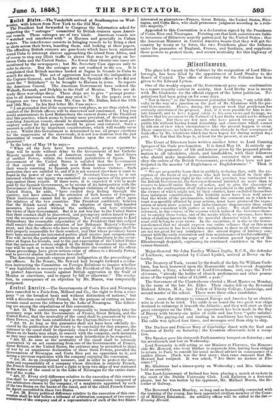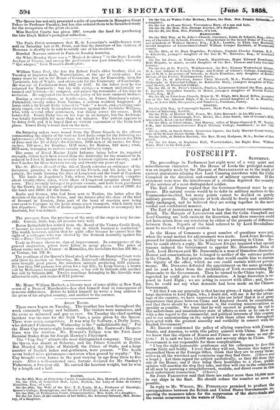Biortllautnn5.
The place left vacant in the Cabinet by the resignation of Lord Ellen- borough, has been filled by the appointment of Lord Stanley to the Board of Control. The office of Secretary for the Colonies has been given to Sir Edward Lytton.
One of the weekly organs of the Government gave some confirmation to a report recently current in society, that Lord Derby was in treaty with Mr. Gladstone for the official support of the latter politician. Ne- gotiations had been going on for some days. " Nor is there," so the Government journalist believes, " any solid diffi- culty in the way of ajunction on the part of Mr. Gladstone with the pre- sent Government. Hence, during the present week that gentleman has seriously entertained the proposal. And, if it were possible for him to iso- late himself, and to have regard solely to his own views and feelings, we believe that his accession to the Cabinet of Lord Derby would not be delayed another day. But there are few men who have passed twenty years in public life without having found friendship and connexions which cannot be left out of view when circumstances like the present happen to occur. These connexions, we believe, form the main obstacle to that acceptance of high office by Mr. Gladstone which has been hoped for during several days past. We fear that the hope is, at least for the present, at au end." — — — The Court of Directors have written another letter to Lord Canning apropos of his Gude proclamation. It is dated May 18. It entirely ap- proves " the guarantee of life and honour given by the proposed procla- mation to all talookdars, chiefs, and landholders, with their followers who should make immediate submission, surrender their arms, and obey the orders of the British Government, provided they have not par- ticipated in the murder of Englishmen or Englishwomen.' " Then it goes on- " We are prepared to learn that in publicly declaring that, with the ex- ception of the lands of six persons who had been stcdfast in their alle- giance, the proprietary right in the soil of the province was confiscated to the British Government, the Governor-General intended no more than to reserve to himself entire liberty of action, and to give the character of mercy to the confirmation of all rights not prejudicial to the public welfare, the owners of which might not, by their conduct, have excluded themselves from indulgent consideration. His lordship must have been well aware that the words of the proclamation, without the comment on it which we trust was speedily afforded by your actions, must have produced the expec- tation of much more general and indiscriminate dispossession than could have been consistent with justice or with policy. We shall doubtless be informed, in due course, of the reasons which induced the Governor-Gene- ral to employ those terms, and of the means which, we presume, have been taken of making known in Oudc the merciful character which we assume must still belong to your views. In the meantime, it is due to the Gover- nor-General that we should express our entire reliance that on this as on former occasions it has been his firm resolution to show to all whose crimes are not too great for any indulgence the utmost degree of leniency con- sistent with the early restoration and firm maintenance of lawful authority." The Court forwards the copy of a resolution passed Apropos of the Ellenborough despatch, expressing its continued confidence in the Go- vernor-General.
Major-General Sir John Eardley Wilmot Inglis, K.C.B., the defender of Lucknow, accompanied by Colonel Lyddel, arrived at Dover on Sa- turday.
The Deanery of York, vacant by the death of the late Sir William Cock- burn, has been bestowed upon the Honourable and Reverend Augustus Duncombe, a Tory, a brother of Lord Feversham, and, says the York- Airman, "already the holder of church preferments and other posses- sions of the reputed value of 12,0001. a year."
The Governors of the Charterhouse elected a Head Master on Monday, in the room of the late Dr. Elder. Their choice fell on the Reverend Richard Elwyn, M.A., late Fellow of Trinity College, Cambridge, and second master of the school. There were three other candidates.
Once more the attempt to connect Europe and America by an electric wire is about to be tried. The cable is on board the two great war ships destined to submerge it beneath the Atlantic ; and they will start on their great enterprise on the 19th. An experiment has been made in the Bay of Biscay with twenty-six miles of cable and has been "quite satisfac- tory." The paying-out and hauling in machinery has been improved. The cable was spliced four times, and messages sent from ship to ship.
The Duchess and Princess Mary of Cambridge dined with the Earl and Countess of Derby on Saturday ; the Countess afterwards held a recep- tion.
The Speaker gave his sixteenth Parliamentary banquet on Saturday ; and his seventeenth and last on Wednesday.
Lord Normanby is still acting as our Minister at Florence, the Honour- able Mr. Howard, who went thither to supersede him, having been obliged to return to Paris to consult his usual medical adviser in consequence of a sudden illness. [Such was the first story ; then came rumours that Mr. Howard had resigned. It was asked, Are there no doctors at Flo- rence ? "] Mr. Gladstone had a dinner-party on Wednesday ; and Mrs. Gladstone held an assembly.
The Lord-Lieutenant of Ireland has been playing a match at rackets in the court of the Dublin University Club. Lord Eglinton is a first-rate player, but he was beaten by his opponent, Mr. Michael Morris, the Re- corder of Galway.
The Reverend Canon Moseley, so long and so honourably connected with the training of the young, has been appointed civilian member of the Coun- cil of Military Education. An artillery officer will be added to the list.— Evening Herald.
The Queen has not only presented a suite of apartments in Hampton Court Palace to Professor Faraday, but has also ordered them to be furnished ready for the occupation of the great chemist.
Miss Burdett Coutts has given 100!. towards the fund for purchasing the late Hugh Miller's geological collection.
The Paris Patric announces that M. de Lamartine's saddle-horses were sold on Saturday last at St. Point, and that the furniture of his chateau of Monceau is shortly to be sold to satisfy one of his creditors.
Marshal Narvaez arrived in Paris on Sunday morning.
On Whit-Monday there was u " Musical Academy " in the State Lunatic Asylum at Vienna, and among the performers was poor Staudigl, who sang " Qui adegno," from Mozart's Zaubel:flote.
William Yates Peel, the late Sir Robert Peel's elder brother, died ou Tuesday at Baginton Hall rwickshire, at the age of sixty-nine. For H
many years he sat in the House of Commons, first for Tamworth, then for Yarmouth, Isle of Wight, and afterwards for the University of Cambridge. He was out of Parliament from 1837 to 1847. In the latter year he was returned for Tamworth ; but his wife dying,—a woman universally es- teemed and beloved,—he resigned, and passed the remainder of his days in seclusion. He supported the free-trade policy of his more eminent brother.
During a steeple-chase, or hurdle-race, at Prince Esterhazy's estate, Pottendorf, twenty miles from Vienna, a serious accident happened. A horse ridden by Count Zichy refused to " take" a brook, aud, swerving sud- denly round, ran with tremendous violence against the Archduke William, who, with several other gentlemen, was riding across the course. Both horses fell. Count Zichy was on his legs in an instant, but the Archduke was totally insensible for more than ten minutes. The patient appears to be doing well, and it is hoped that no violent concussion of the brain took place. Count Zichy's horse died on the spot.
On Saturday orders were issued from the Horse Guards to the officers commanding the depots of the various East India corps for the following re- inforcements of her Majesty's troops, to embark for India between the 24th of Juno and the 2d of J uly—for Calcutta, 2930 men of all ranks ; for Kur- rachee, 790 men ; for Bombay, 1130 men; for Madras, 820 men ; total, 5670 men, belonging to various cavalry aud infantry corps.
The corps of Royal Marine Light Infantry being below its required strength, orders have been issued from the Admiralty for the standard to be reduced to 5 feet 51 inches for recruits between eighteen and twenty, and 5 feet 6 inches for those between twenty and twenty-six years of age.
The St. Helena Herald of the 4th of March contains an ordinance of the Governor, granting to the Emperor of the French, and his heirs in per- petuity, the lands forming the sites of Longwood and the tomb of Napoleon I. The lands in Napoleon's Vale, where the tomb is situated, comprise about twenty-three acres, while those of Longwood comprise about three acres. They recently belonged to private owners, and have been purchased by the Crown for the purpose of the present transfer, at a cost of 16001. for the tomb and 3500/. for the house.
Rudio and Gomez, who had been sent to Toulon, the latter after the decision of the jury of the Seine, and the former after the close' of the trial of Bernard in London, form part of the band of convicts now being conveyed to Cayenne by the Loire steam screw transport, which lately took her departure. The wife of Rudio applied for permission to accompany her husband, but was refused.
The accounts from the provinces of the state of the crops is very favour- able. Cereals, fruit, hay, all promise very well.
Baron Rothschild has retired from the Board of the Vienna Credit Bank, " because he does not approve the way in which business is conducted." The world, however, asserts that he quits office because he cannot bear the sight of a colleague who was elected by the General Assembly against his Correspondent.
Trade in France shows no sign of improvement. In consequence of the general stagnation, prices have fallen in many places. The price of wheat varies much in France : at Marseilles, the hectolitre fetches 191.860. ; at Verdun, but 13f. 5c.
The yearlings of the Queen's blood stock of horses at Hampton Court were sold there by auction on Saturday, Mr. Tattersall officiating. The young- sters brought good prices, the nineteen animals producing 4165 guineas. No less than 780 guineas was given for a bay filly, by Loup Garou ; a brown colt by Melbourne brought 610 guineas, a bay colt by Orlando 550, another bay colt by Orlando 500. Twelve yearlings belonging to Mr. Greville were afterwards sold, and realized 2772 guineas.
Mr. Henry William Herbert, a literary man of some ability at New York —eon of a Dean of Manchester—has shot himself dead in consequence of domestic differences. Before he killed himself he wrote a long address to the press of his adopted country, and another to the coroner.



































 Previous page
Previous page